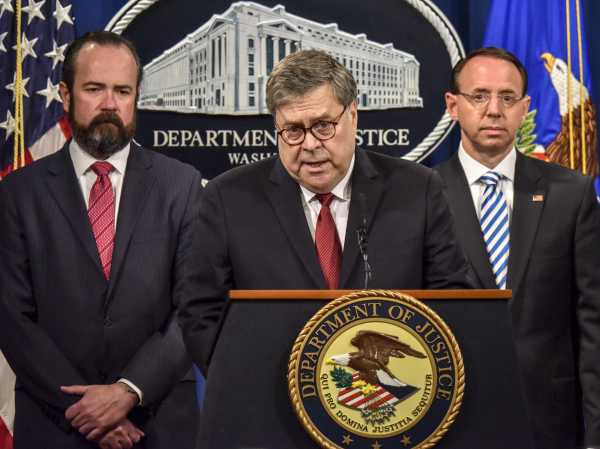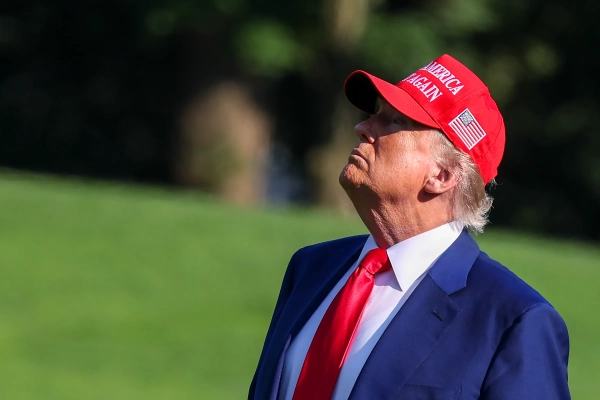
Robert Mueller has never really been the face of his own special counsel investigation.
That role has mostly fallen to others in the Department of Justice: former Deputy Attorney General Rod Rosenstein, for most of it; Matthew Whitaker, briefly and controversially. And, of course, Attorney General William Barr, who arrived toward the end and steered the public release of the probe’s findings, and the narrative surrounding it.
But on Wednesday, Mueller will (albeit reluctantly) reclaim the spotlight when he appears before two House committees to testify on the findings of his investigation into Russian interference in the 2016 election and whether President Donald Trump obstructed justice.
It’s unlikely Mueller will offer much beyond what’s in his 448-page, partially redacted report (Mueller said as much in May). And, according to the Washington Post, the Justice Department is holding Mueller to that, instructing him “not to go beyond” what’s in the public report.
What’s definitely not in Mueller’s report is how much friction (if any) existed between the Department of Justice — Barr in particular — and Mueller’s team. But lawmakers are very likely going to ask Mueller about just that.
Signs of tension have cropped up here and there since the report’s release, most notably in a letter that Mueller sent to Barr suggesting that the attorney general’s four-page summary of the principal conclusions of the report, released a month before the actual text, did not “fully capture the context, nature, and substance” of the investigation. And then there’s Barr’s own attempts to “reinvestigate the investigators.”
Democrats will almost certainly use the hearings Wednesday to try to uncover any deeper discord between Mueller and Barr, especially since House Democrats have had their own very public battles with the attorney general.
At the same time, it’s likely that Mueller — a seasoned prosecutor who’s no stranger to congressional hearings and who’s made it pretty obvious he wants to stay above politics — is going to do everything he can to keep from being pulled into the squabble.
But there are legitimate questions about how Barr handled the report’s release and his role in downplaying the special counsel’s conclusions.
Since it’s been a while since all of this was in the news, here’s a reminder of what happened to get you caught up ahead of the hearings on Wednesday.
Let’s start with the basics: How does Barr fit into the Mueller investigation?
In March 2017, Trump’s attorney general, Jeff Sessions, recused himself from overseeing the Russia investigation after it emerged he had contacts with Russian officials during the 2016 campaign. That responsibility then fell to the deputy attorney general. Rod Rosenstein, who was confirmed in April, eventually took over. Rosenstein appointed the special counsel in May 2017 after Trump fired FBI Director James Comey, and he managed the Mueller probe for most of its duration.
Trump publicly berated Sessions for months for having recused himself, suggesting that he Sessions should have protected him from the probe. (Mueller examines this dynamic in his report, as part of his obstruction inquiry.)
In November 2018, Sessions finally resigned. That temporarily moved the investigation into the hands of then-Acting Attorney General Matthew Whitaker. Trump nominated Bill Barr, a former attorney general himself, for the permanent job in December 2018.
His nomination was controversial — if confirmed, he’d control the Mueller investigation. And it soon emerged that he’d made statements both publicly and privately questioning the legitimacy of the investigation and the impartiality of Mueller and his team — including an 18-page letter he wrote to Rosenstein arguing that Mueller’s obstruction of justice inquiry into the president was “fatally misconceived”
Barr was confirmed despite these concerns, and in February 2019, he assumed control of the Mueller investigation.
Barr framed the initial narrative around the Mueller report
On March 22, Mueller submitted his final report to the attorney general. And just two days later, Barr released a four-page letter that outlined what he described as the “principal conclusions” of the Mueller report.
According to Barr, those conclusions were: 1) Russia interfered in the 2016 election, and 2) there was no criminal conspiracy between the Trump campaign and the Russian government. On the question of whether the president obstructed justice during the investigation, Barr said the special counsel did not draw a conclusion one way or the other.
But Barr himself drew a conclusion on that score: In the same letter, he said that he, along with Rosenstein, had determined that the evidence “is not sufficient to establish that the President committed an obstruction-of-justice offense.”
So Barr, not Mueller, is the one who ultimately determined that the president did not obstruct justice. This led the president to triumphantly declare: “total exoneration.”
But, of course, the Mueller report was far more complicated and knotty than Barr’s initial “principal conclusions” — and Mueller, it turns out, objected to Barr’s characterization.
Barr’s strange press conference ahead of the April release of the redacted report
Barr promised to be as transparent as possible in releasing the full report, limiting the redactions to four areas: confidential grand jury material; personal information involving third parties; material related to ongoing investigations; and classified information. (Vox calculated that just about 7.25 percent of the report was redacted — so it doesn’t seem overly blocked out.)
On the day the report was to be released, Barr held a morning press conference in which he tried to positively spin the report’s findings in the president’s favor — before anyone, including the reporters in attendance, had been given the chance to see the full report.
As Vox’s Zack Beauchamp explained, “Barr literally uttered the phrase “no collusion” to describe Mueller’s conclusions — providing a perfect sound bite to play on loop on cable news in the president’s favorite phrasing.” Beauchamp continued:
The attorney general’s unusually robust defense of the president stuck out even more after the report was made public later that day. The 448-page, partially-redacted report details numerous instances of shady conduct by Trump and his associates both during the campaign and after Trump took office.
As Vox’s Andrew Prokop has written:
That’s quite a different picture than the one Barr tried to sell to reporters — and the American people — shortly before the report’s release.
Mueller privately objects to Barr’s portrayal of his report
Mueller publicly stayed silent through all of this. But on the eve of Barr’s May testimony to the Senate Judiciary Committee about the Mueller investigation, reports leaked that Mueller had written to Barr a few days after the attorney general released his “principal conclusions” to say that Barr’s description did not fully capture “the context, nature, and substance” of his report.
“There is now public confusion about critical aspects of the results of our investigation,” Mueller wrote in the letter, dated March 27. (The full later was released by the House Judiciary Committee on May 1.)
At the time, the full report had not yet been released, but Mueller urged Barr to at least make public the introductions and executive summaries from the report’s two volumes to correct the record. (Volume I covers Russian interference in the 2016 election and any links between Russian officials and the Trump campaign; Volume II covers Trump’s response to the investigation, meaning it mostly focuses on the question of obstruction of justice.)
Barr did not follow through with Mueller’s initial request, a decision he later defended to the Senate Judiciary Committee, saying he told Mueller he “was not in the business of putting out periodic summaries because a summary would start a whole public debate.” Instead, he said he wanted to work with Mueller’s team to put out the full report as soon as possible. (He also referred to Mueller’s letter as “a bit snitty.”)
This whole back-and-forth drama between Barr and Mueller seemed to further confirm to Barr’s critics that he’d deliberately misrepresented the report’s findings in order to make the president — his boss — look better.
That view grew even stronger when Barr publicly echoed the conspiracy theory that the FBI may have “spied” on the president’s campaign and announced he was launching a sweeping review of how the Russia investigation was conducted.
What all this means for Mueller’s testimony on Wednesday
Democrats and Republicans are likely to have questions for Mueller about his interactions with Barr and the Department of Justice in the weeks leading up to the conclusion of his investigation and the weeks after he filed his report.
There are legitimate issues here. Democrats will likely want to know why Mueller wrapped up the probe when he did, and if Barr (or anyone else) had a say in the timing. But right now there’s absolutely no evidence of such interference.
They’ll also want to hear more from Mueller about how he thinks Barr handled the release of the report. And they’ll almost certainly want to know more about why Mueller didn’t come to a conclusion on obstruction of justice — and what he thought about Barr stepping in to make his own judgment.
Republicans, too, will probably have questions about Mueller and his team’s interactions with the Justice Department — after all, it was just a year ago this week that Republicans were threatening to impeach Rosenstein, who was in charge of the Russia probe at the time, for failing to turn over documents relating to sensitive investigations, including the Russia inquiry.
They’ll want to know about prosecutorial decisions Mueller’s team made, and they’ll almost certainly bring up Mueller’s firing of Peter Strzok, the former FBI agent on Mueller’s team who sent anti-Trump texts to Lisa Page, a Department of Justice lawyer with whom he was having an affair.
And, of course, they’ll want to know more about possible political bias on Mueller’s team more generally. These, too, are critical questions that Mueller should answer, in part because his silence on all of it has allowed those skeptical of the investigation to fuel suspicions about the legitimacy of the investigation.
Given his record of trying to stay above the political fray, it’s unlikely Mueller will indulge either Democrats or Republicans in their quest to score political points from his testimony. But that doesn’t mean they’re not going to try.
Sourse: vox.com






